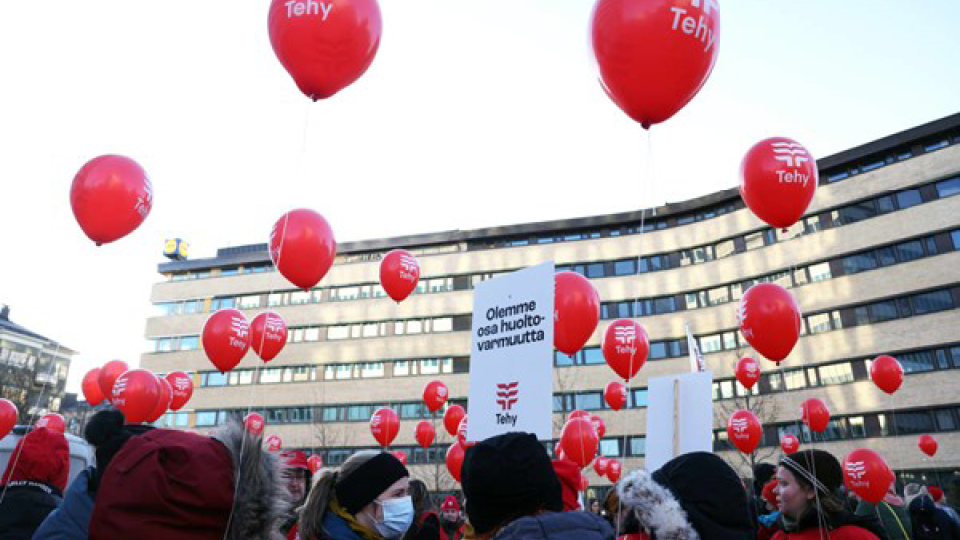Finnish nurses call for improved salaries and working conditions to address nursing shortage and patient safety

Photo credit: Benjamin Suomela / Yle
On 1 April 2022, 25,000 healthcare professionals, including registered nurses, went on strike in six hospital districts in Finland to protest for decent salaries and working conditions.
The strike is led by trade unions, Tehy, the Union of Health and Social Care Professionals in Finland and SuPer, the Finnish Union of Practical Nurses. The Finnish Nurses Association, a member of the International Council of Nurses (ICN), is not a negotiating partner, but closely collaborates with Tehy and fully supports the strike.
Tehy and SuPer called for the strike, which will run until 15 April and includes a ban on overtime work for those not involved in the strike, to protest the lack of improvement in working conditions and salaries, despite the hard work and stress endured by health workers during the pandemic. Pay increases offered by employers fell far short of the rises requested by staff representatives. Tehy and SuPer have proposed a rescue programme to tackle the shortage of social and healthcare professionals and to improve working conditions, including an extra 3.6% increase annually over the next five years on top of the standard pay increase. A further strike of 40,000 healthcare professionals will take place mid-April unless an agreement is reached.
While some hospital managers and chief medical officers have expressed their concern that the strike will affect patient safety and the health of patients, many nurses on social media have said that, due to the protected work rules in place during the strike, they are experiencing better staffing than usual. One nurse in a paediatric intensive care ward said they now have nine nurses per shift which is much higher than in the past three months. Another nurse in the dialysis treatment centre of Turku University Hospital, said that contrary to reports, they currently have five nurses in the protected work, which is more than in normal times, and that all the needed dialysis treatments have been done, with no one left without treatment.
Nina Hahtela, President of the Finnish Nurses Association said:
”In recent years on many occasions, we have raised our deep worry about the increasing lack of nurses, and its effect on patient safety and healthcare services, but this has not been heard. Salary and working conditions are the key factors to solving the situation. Nurses’ salary at the moment does not correspond to the demands and responsibilities of the job and the level of education, and is far from the colleagues in the other Nordic countries, for example. The politicians and leaders have not raised concerns about patient safety before the strike, even though it has been in danger daily because of too few nurses. Nurses have been incredibly flexible, but there is a limit to that. Many of our nurses are really exhausted. This strike is to correct the situation, not to worsen it - to find ways to recruit and retain nurses now a nd in the future. None of us wants the strike, but this is now the only solution left. Nurses were praised as invaluable during the pandemic and now it is so sad to read the news and witness the lack of support by the hospital leaders.
‘Furthermore, the health ministry is now preparing legislation to force more nurses to work during the strike. This is totally unacceptable. The strike is legal and negotiations on necessary protected work are held according to the law.”
The Finnish Nurses Association reported that the average monthly basic wage of nurses in Finland (including supplements for evening, Sundays etc.) is €3183 compared to €3527 for the average monthly wage in Finland in general. According to the Professional Barometer published in September 2021, registered nurses were number one on the list of occupations experiencing labour shortages in Finland.
ICN CEO, Howard Catton reacted to the news of the strike saying,
“ICN considers strike action to be the measure of last resort; to be taken only after all other possible means to conclude an agreement have been explored and utilised. However, we have been warning governments of the serious long-term consequences to health and health systems if the chronic worldwide nursing shortage is not addressed. Nurses and other health professionals must be recognised and rewarded for their work in order to retain the current workforce and attract others into the profession. There will be a real threat to patient safety if we do not address this chronic shortage now.”
A report published by ICN in January this year, Sustain and Retain in 2022 and Beyond, called on governments to value and invest in the nursing profession in order to retain and recruit nurses and “to stem the tide of those leaving nursing because of the additional stresses resulting from COVID-19”.
See also: ICN’s position statement on industrial action
Press release by Tehy and SuPer
Download the communique here